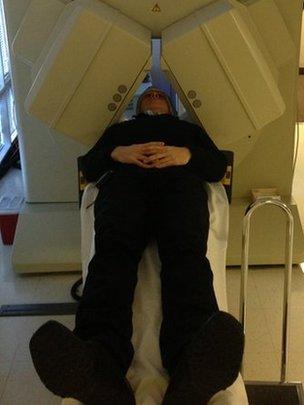Can you use your brain to 'change your age'?
- Published
Dr Daniel Amen shows Peter Bowes the results of his brain scan
Bombarded with adverts promising a longer, healthier life, Peter Bowes in Los Angeles goes in search of eternal youth.
Is mental infirmity an inevitable consequence of getting old? Or could we enjoy a more clear-headed old age?
In California it's common to see advertisements promoting brain training or brain workouts which claim to help reverse the effects of ageing.
"The old adage is really true: if you don't use it, you lose it," says Dr Leslie Sherlin, chief science officer at Neurotopia, a Los Angeles-based brain-training company.
"The more we use it, the stronger, the more adaptive, and the more resilient it becomes."
Brain training can be as simple as doing crossword puzzles or remembering telephone numbers.
But whether these techniques can help someone's mind stay young, or have an impact on age-related diseases such as Alzheimer's, is a matter of debate.
"There's a lot of promising theory but the data is just not in," says Sherlin. "It needs to be really thoroughly examined. But from a theoretical perspective and anecdotal evidence, the possibilities are right there."
Another way to counteract the effects of ageing on the brain is promoted by Dr Daniel Amen. The California-based psychiatrist claims that his brain scanning programme can spot the problems that prevent many from living longer and looking younger. One of his books is even entitled - Use Your Brain To Change Your Age.
"Your brain actually starts deteriorating years before you have any symptoms," says Amen.
To diagnose his patients, Amen uses blood tests, cognitive tests, an exploration of family history as well as a brain scan, known as a SPECT or a Single Photon Emission Computed Tomography scan, external. It shows how blood flows as a measure of activity in the brain.
The result is a three-dimensional image in which areas low in blood flow are depicted as holes on the surface of the brain.
Amen's analysis of my brain suggested there were low levels of activity in my prefrontal cortex and cerebellum consistent with attention span and memory problems.
At 50, I brush off problems with my memory as a normal function of ageing.
"It's not normal, not even at 70," says Amen. "It means your brain is beginning to struggle."
Amen thinks our lifespan is in part determined by brain function. People should be able to make prudent decisions, such as not eating or drinking too much. People need to drive safely, get enough sleep, choose friends sensibly and have organising skills to avoid stress.
But this is just common sense. So what is the point of the scan?
Mark Affleck, a retired executive in the California avocado industry, consulted Amen a year ago because, at 56, he says he felt "foggy and hazy". A scan of his brain revealed a moonscape surface with the gaps and holes that Amen associates with poor health.
Affleck says it prompted him to change his life. He now takes a 45-minute walk most days. He lifts weights every other day. He eats a diet rich in vegetables and has reduced his intake of caffeine and sugar.
Six months in and Affleck says his second brain scan looked different. Some of the holes had "filled over and looked healthy".
"I don't think it's essential (to have a scan) but there's something about seeing it - and then seeing it change - that is very powerful," he adds.
To boost blood flow to certain parts of my brain, Amen suggested I eat less bread and more vegetables, take dietary supplements such as fish oil and vitamins, and use melatonin - a hormone that aids sleep, and is available over the counter in many countries. To improve my attention span, he also suggested that I take up table tennis - a co-ordination exercise to boost activity in my cerebellum, the region of the brain that plays an important role in motor control.

Despite all the tests, I am still 50
After two months I felt more alert, and revisiting Amen I could see small changes in the appearance of my re-scanned brain. But a healthier lifestyle was always going to make me feel better.
At $3,600 Amen's consultation and scan is not cheap and not all experts see the point of it.
Dr Gary Small, Director of the UCLA Longevity Center, says: "I've spent my career developing brain scan technology and I think there is a lot of promise to it. But before I order any diagnostic test... I always ask myself, 'Is this really going to change the patient's outcome? Is it going to change the therapy? Is it going to be something helpful?'"
Dr Helen Mayberg, Professor of Psychiatry, Neuorology and Radiology at Emory University in Atlanta, Georgia, is more critical.
"There is no evidence that these type of scans can be used as a general screening procedure for confirming you are healthy or to diagnose a specific condition," she says.
"He is an engaging speaker giving common sense advice that resonates with most peoples' general sensibilities.
"The brain scans are an unnecessary prop but add a level of seemingly scientific (but untested) corroboration of his claims."
Having peered into my brain, my age has not changed. I am still 50. And it is debatable whether an expensive scan is necessary to make anyone adopt a sensible lifestyle.
But of course this is not about actually reversing your age. It is about the human body functioning at its best and making good decisions to look, feel and think younger - and in that respect, I get it. As my father always said, "Use your brain."
Peter Bowes was seen by Daniel Amen free of charge.
You can follow the Magazine on Twitter, external and on Facebook, external